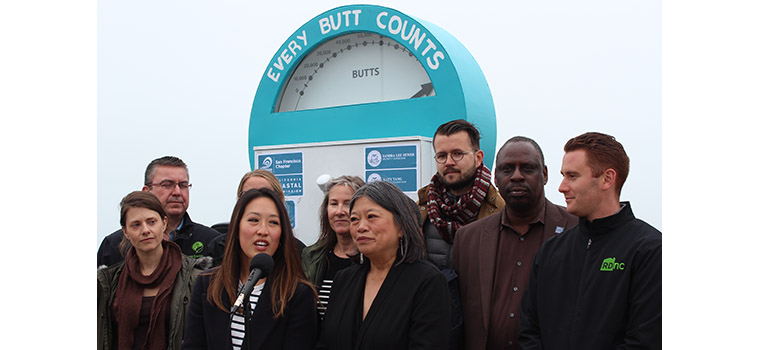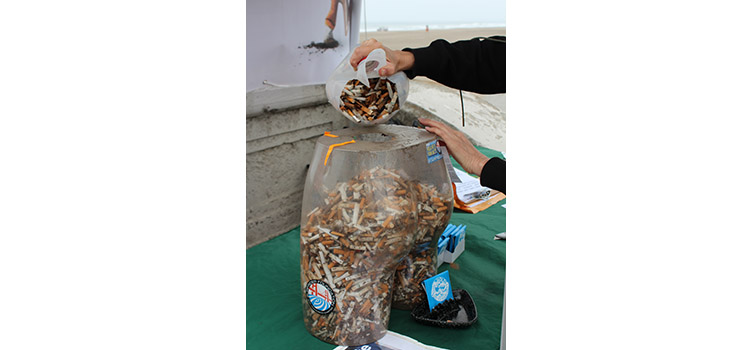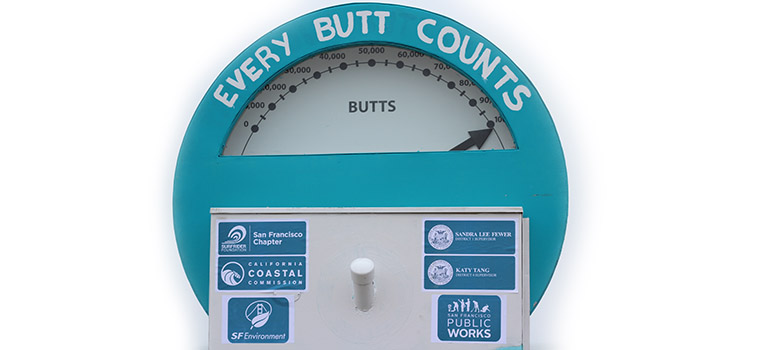San Francisco's Sunset and Richmond neighborhoods stepped up the city's ever more comprehensive environmental protection efforts last month with a six-month pilot project aiming to eliminate tens of thousands of cigarette butts from the waste stream.

Supervisors Katy Tang and Sandra Lee Fewer, along with the Surfrider Foundation and San Francisco Public Works, are the driving forces behind the installation of 40 cigarette butt receptacles along Ocean Beach and on busy west side commercial corridors. SF Dept of the Environment
BY BILL PICTURE
Published: August, 2017
San Francisco’s Sunset and Richmond neighborhoods stepped up the city’s ever more comprehensive environmental protection efforts last month with a six-month pilot project aiming to eliminate tens of thousands of cigarette butts from the waste stream. Supervisors Katy Tang and Sandra Lee Fewer, along with the Surfrider Foundation and San Francisco Public Works, are the driving forces behind the installation of 40 receptacles along Ocean Beach and on busy west side commercial corridors—with the goal of giving smokers a place to toss their butts.
Studies conducted by the SF Department of the Environment (SF Environment) and San Francisco Controller’s Office in 2009 and 2014 showed a 68 percent decrease in the total amount of litter collected over the five-year period. Tobacco-related litter, however, increased 29 percent over the same period. During a two-hour cigarette butt cleanup organized by Surfrider earlier this year, volunteers collected 4,200 butts along Ocean Beach and Noriega Street, another 4,615 on 19th Avenue between Lincoln Way and Taraval, and 6,000 more along Balboa Street. Cigarette butts and tobacco-related products are currently the most littered item in San Francisco.
“It’s a never-ending cycle,” said Supervisor Tang. “These cleanups happen, and within a few months, the butts are back.” “We see [cigarette] butts on the ground all time and probably don’t think anything of it,” said Supervisor Fewer. “But when they’re collected and you see them in front of you in a huge pile, it really hits you what a big problem this really is.”
“Cigarette butts blight our neighborhoods, harm wildlife and are labor-intensive for crews and volunteers to pick up,” said San Francisco Public Works Director Mohammed Nuru. “We’re hopeful this butt can pilot program will get smokers to stop using our sidewalks and streets as ashtrays.”
A grassroots beginning
Supervisors Tang and Fewer insist the credit for the abatement effort goes to their districts’ residents and merchants, who first identified the problem and took it upon themselves to address it.
“The Richmond District Neighborhood Center organized a meeting last year to discuss litter along the Balboa Corridor, and everyone at that meeting agreed something had to be done about all of the cigarette butts that were ending up on the ground,” Supervisor Fewer said.
“The local merchants took it upon themselves to put ash cans in front of their businesses, and it was so successful that Public Works decided to do the same thing in other parts of the city.”
The supervisors agree that a program like this one has the best chance of success when it’s hatched by the community it directly affects. “This is what happens when neighbors see a problem and rather than just complaining about it, actually do something about it,” said Supervisor Fewer.
“I love how they’ve been so proactive,” Supervisor Tang added. “The government tries different things, and they don’t always work. So it’s great when the community comes to us with an idea. And whenever there’s some problem that we need help tackling, I make a point to go to my constituents and say, ‘What do you think we should do?’ Having another perspective is really important.”
Teaching a smoking dog new tricks
The new ash cans are just part of a comprehensive plan to encourage those who aren’t willing to give up smoking to be more responsible when it comes to disposing of their butts. “Smokers are for the most part now mindful of where they smoke, so this would be the next step,” said Supervisor Tang. “Like with any sustainability program, it’s about getting people to take responsibility. Keeping the environment clean is everyone’s personal responsibility.”
To that end, the pilot program includes an education component. By bringing the problem to light and increasing awareness of the hazards that littered butts pose both to the environment and the health of San Franciscans, organizers hope to retrain smokers to think of their finished cigarette as the litter that it is.
“Flicking cigarettes on the ground is a common habit, and many people think cigarette filters are biodegradable,” said Surfrider volunteer Shelly Ericksen. “But cigarette filters are made of tiny strands of cellulose acetate—the same plastic as your sunglasses. They are loaded with toxic chemicals including arsenic, lead and cadmium, poisoning animals that mistake them for food. When those chemicals get into our oceans and leach into our groundwater, they threaten the safety of wildlife and the water we drink.”
“Behavioral change is often tough,” said Supervisor Fewer. “But in this case, I think it’s as simple as giving smokers someplace to put their cigarette butts.” “Give them another option besides tossing it on the ground,” Supervisor Tang said. “It’ll take a little time, but they’ll get in the habit of using the cans.”
Neither supervisor foresees the need for any kind of legislation. In fact, they say putting something on the books would be a waste of time for the simple fact that such a law would be impossible to enforce. Besides, there are already litter laws in place, not to mention a tax on cigarette sales that is partially used to help pay for cigarette butt cleanups.
“You can have all the laws you want, but if they’re not enforceable in a practical way, what’s the point,” said Supervisor Tang. “And I’m more of a carrot person than a stick person,” said Supervisor Fewer, “so I’d rather try to bring about awareness of the problem than try to pass more laws.”
Over the next six months, San Francisco Public Works ambassadors will be servicing the cans and helping gauge their use. If organizers determine that the cans resulted in a significant decrease in cigarette butt litter, the city may consider expanding the program citywide.
“This pilot project is a great example of an innovative, community-driven response to litter and pollution prevention,” said SF Environment Director Debbie Raphael. “Whether it’s surfers out at Ocean Beach who see the impacts of cigarette butts or our local merchants who just want cleaner sidewalks, when we come together to solve our problems, our environments and our neighborhoods benefit.”

The number of cigarette butts discarded on city streets is astounding. SF Dept of the Environment

The pilot program may be expanded if the new receptacles are successful. SF Dept of the Environment

